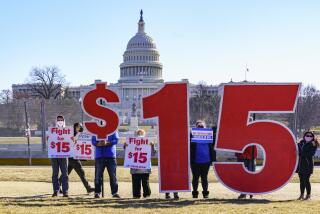No minimum wage for home-care aides
- Share via
WASHINGTON — The nation’s home healthcare aides are not entitled to minimum wages or overtime pay under federal law, even if they work for private employers, the Supreme Court ruled Monday.
The 9-0 decision, which keeps in place a long-standing rule that denies minimum wages and overtime pay to those who provide “companionship services” at home, could trigger a move in Congress to amend the law.
With an estimated 1 million workers assisting the elderly and the disabled in their homes, unions and civil rights groups had urged the justices to scrap the rule; they say it deprives many of the nation’s lowest-paid workers of a living wage.
They say a large percentage of these aides are women and minorities who often work all-night shifts. Yet, under federal labor law, they are viewed the same as part-time baby sitters.
A U.S. appeals court in New York had ruled that the minimum-wage law applied to those home-care workers who are employed by a private company or a public agency. If it had been upheld, this decision would have given overtime pay and minimum wages to the vast majority of the nation’s home-care workers.
But the Supreme Court overturned the decision and said, in essence, that it is up to Congress to change the law. The Fair Labor Standards Act was first enacted in 1938, and is enforced through regulations set by the Labor Department.
The decision is “another blow to struggling, low-wage women,” said Nancy Duff Campbell, co-president of the National Women’s Law Center. It means “profit-making companies can legally choose to pay home-care workers deplorably low wages or deny them just compensation for overtime.”
The federal minimum wage is $5.15 per hour, and it will increase to $5.85 on July 24. Under a recently enacted measure, it will rise gradually to $7.25 per hour in July 2009. Workers who put in more than eight hours in a day receive 1 1/2 times their pay rate for overtime.
The impact of the ruling will vary by state, since many have their own minimum-wage and overtime laws. Union lawyers cited Colorado, Illinois, Kansas, Michigan, Minnesota, Nevada, Pennsylvania, Washington and Wisconsin as states with laws that ensure minimum wages and overtime for home-care workers.
In California, state law says “personal attendants” who are hired to provide home care are entitled to a minimum wage -- currently $7.50 per hour -- but they are not entitled to overtime pay, said Travis M. Gemoets, a Los Angeles lawyer who specializes in labor law.
“This decision is nevertheless helpful to California employers,” he said, because a ruling affirming the New York decision would have required all employers to pay overtime to home-care workers.
The Service Employees International Union sued to challenge the exemption to minimum wages on behalf of Evelyn Coke, a 73-year-old retiree who worked for more than 20 years in the homes of elderly patients. She was employed by Long Island Care at Home, a private company that provided home-care aides for elderly people.
The city of New York and the home-care industry opposed her suit on the grounds that it would drive up the costs of providing care for the poor and the elderly. New York City said a ruling in Coke’s favor would add $300 million a year to the cost of its Medicaid program, mostly because of overtime costs.
The Supreme Court’s opinion in Coke vs. Long Island Care at Home avoids the broad issue of fair wages for home-care workers. Instead, it focuses narrowly on whether the Labor Department’s regulations are a reasonable interpretation of what Congress intended.
In 1974, Congress expanded the reach of the minimum-wage law but said again that those in “domestic service employment” were not covered.
Gerry Hudson, executive vice president of the Service Employees union, said the ruling would “hurt efforts to provide America’s growing senior population and people with disabilities with the quality, reliable in-home care they will need to live independently.”
But he noted the ruling leaves it for “a new administration” to drop the exemption for home-care employees or for Congress to amend the law.
Also on Monday, the Supreme Court strengthened the environmental cleanup law by ruling that those who undertake cleanups on their own can sue other polluters and force them to pay part of the cost.
Bush administration lawyers had opposed such suits.
The unanimous ruling is a victory for California’s water agencies, which told the court they need to clean up pollution first and then sue the polluters to pay their fair share of the cost.
More to Read
Sign up for Essential California
The most important California stories and recommendations in your inbox every morning.
You may occasionally receive promotional content from the Los Angeles Times.














